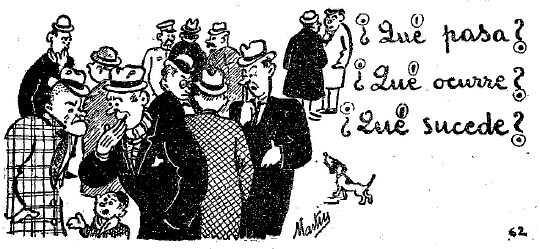
| Языки :: Испанский |
| Аудио |
 |
|
|
179 |
Español |
Spanish |
|
Lección Sesenta y dos (62) |
||
| Varios sucesos (1) | News items [various events]. | |
| 1 |
Robo a mano armada. — Barcelona, miércoles, 7 de Enero. |
Theft by force of arms fat armed hand]. — B., Wednesday, Jan. 7 th. |
| 2 |
En una ebanistería de la calle de Gerona, número 147 (2), entraron cuatro individuos, |
In a cabinet-maker's shop of G. street, n° 147, 4 men entered, |
| 3 | que después de amenazar al dueño y a los obreros, | who after [of] threatening [at] the master and [at] the workmen, |
| 4 | rompieron cuantos objetos encontraron a mano. | broke all the [so many] things which they found at hand. |
| 5 |
Luego se llevaron la cartera del dueño, que contenía cien
pesetas y dos décimos de lotería del próximo sorteo; (3) |
They then brought away the master's wallet, which contained 100 p. and two one-tenth lottery tickets of the next drawing : |
| 6 |
también robaron cinco pesetas en metálico, un reloj de bolsillo y otros objetos de valor (4). |
they also stole 5 p. in coins [metallic], a [pocket] watch and other things of value. |
| 7 |
Una riña. — Vigo, jueves, 3 de Febrero. — En el pueblo de Las Cruces, |
A riot. — Vigo, Thursday, Feb. 3. — In the locality of L. C., |
| 8 |
riñeron Pedro Gómez y Marcelino Vázquez, resultando éste gravemente herido. |
P. G. and M. P. fought and the latter was [resulting] seriously wounded. |
| 9 | El agresor, Pedro Gómez, ha sido encarcelado (5) | The aggressor, P. G., has been imprisoned. |
| EJERCICIOS | EXERCISE : | |
| 1 |
Cantar Las palabras amorosas son las cuentas de un collar : que en saliendo la primera salen todas las demás. |
Love words — are the beads of a necklace — for (which], when [in] unstringing the first — all the others become unstrung [come out]. |
| NOTES. | |
| 1 |
Suceder = ocurrir = pasar. — ¿ Qué ha sucedido?, ¿ Qué ha ocurrido?, ¿ Qué ha pasado?, What has happened? — El suceso : the event. |
| 2 | 147 : see number of page. |
| 3 |
Llevar, to carry or have about oneself. Llevarse una cosa, to take a thing (with one). La carta, the letter; la cartera, the wallet; el cartero, the postman. |
| 4 |
Robar, to rob, steal — En metálico, in "metallic", in coins, not in notes (billetes). — El reloj (raylawH) means : anything showing the time; one distinguishes : el reloj de bolsillo (of pocket) : the watch; el reloj de pared (of wall), the clock; el reloj de pulsera (of bracelet), the wrist-watch; el reloj de arena (of sand), hour-glass; el reloj de sol (of sun), the sundial. |
| 5 |
The latter: éste; the former: ése. La cárcel, the prison. |
|
La cuenta, the account, bill and also the bead of a
string of b. (to count prayers with) or of a necklace. — The tale : el cuento. — The count : el conde. |
